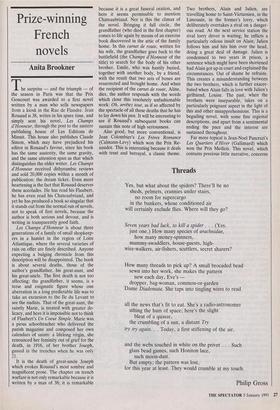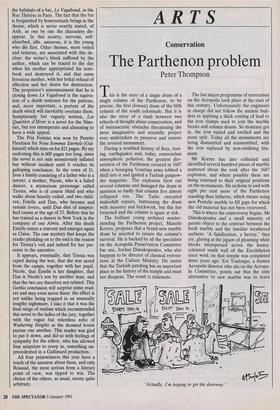Prize-winning French novels
Anita Brookner
The surprise — and the triumph — of the season in Paris was that the Prix Goncourt was awarded to a first novel written by a man who sells newspapers from a kiosk in the Rue de Flandre. Jean Rouaud is 38, writes in his spare time, and simply sent his novel, Les Champs d'Honneur, through the post to the austere publishing house of Les Editions de Minuit. This house also publishes Claude Simon, which may have prejudiced his editor in Rouaud's favour, since his book has the same austerity, the same gravity, and the same attention span as that which distinguishes the older writer. Les Champs d'Honneur received dithyrambic reviews and sold 20,000 copies within a month of publication: the dream ticket. Even more heartening is the fact that Rouaud deserves these accolades. He has read his Flaubert, he has even read his Chateaubriand, and yet he has produced a book so singular that it stands out from the normal run of novels, not to speak of first novels, because the author is both serious and devout, and is writing in transparently good faith.
Les Champs d'Honneur is about three generations of a family of small shopkeep- ers in a hamlet in the region of Loire Atlantique, where the several varieties of rain on offer are finely described. Anyone expecting a bulging chronicle from this description will be disappointed. The book is about several deaths, those of the author's grandfather, his great-aunt, and his great-uncle. The first death is not too affecting: the grandfather, it seems, is a terse and enigmatic figure whose one aberration in a long predictable life was to take an excursion to the Ile du Levant to see the nudists. That of the great-aunt, the saintly Marie, is treated with greater de- licacy, and here it is impossible not to think of Flaubert's Un Coeur Simple. Marie was a pious schoolteacher who delivered the parish magazine and composed her own calendars of saints: a lifelong virgin, she renounced her feminity out of grief for the death, in 1916, of her brother Joseph, gassed in the trenches when he was only 21.
It is the death of great-uncle Joseph which evokes Rouaud's most sombre and magnificent prose. The chapter on trench warfare is not only remarkable because it is written by a man of 38; it is remarkable because it is a great funeral oration, and here it seems permissible to mention Chateaubriand. Nor is this the climax of the novel. Bringing it full circle, the grandfather (who died in the first chapter) comes to life again by means of an exercise book discovered in the attic of the family home. In this carnet de route, written for his wife, the grandfather goes back to the battlefield (the Champs d'Honneur of the title) to search for the body of his other brother, Emile, who was hastily buried, together with another body, by a friend, with the result that two sets of bones are resurrected and brought home. And when the recipient of the carnet de route, Aline, dies, the author responds with the words which close this resolutely unfashionable work: Oh, arretez tout, as if so affected by the spectacle of all these deaths that he has to lay down his pen. It will be interesting to see if Rouaud's subsequent books can sustain this note of high seriousness.
Also good, but more conventional, is Jean Colombier's Les Freres Romance (Calmann-Levy) which won the Prix Re- naudot. This is interesting because it deals with trust and betrayal, a classic theme. Two brothers, Alain and Julien, are travelling home to Saint-Victurnien, in the Limousin, in the former's lorry, which deliberately overtakes a rival on a danger- ous road. At the next service station the rival lorry driver is waiting; he inflicts a particularly odious insult on Alain; Julien follows him and hits him over the head, doing a great deal of damage. Julien is condemned to two years in prison, a sentence which might have been shortened had Alain got up in court and explained the circumstances. Out of shame he refrains. This creates a misunderstanding between the two brothers, which is further exacer- bated when Alain falls in love with Julien's girlfriend, Louise. The past, when the brothers were inseparable, takes on a particularly poignant aspect in the light of this and other misapprehensions. This is a beguiling novel, with some fine regional descriptions, and apart from a sentimental ending the pace and the interest are sustained throughout.
Far more topical is Jean-Noel Pancrazi's Les Quartiers d'Hiver (Gallimard) which won the Prix Medicis. This novel, which contains precious little narrative, concerns the habitués of a bar, Le Vagabond, in the Rue Therese in Paris. The fact that the bar is frequented by homosexuals brings in the theme, which is never overtly stated, of Aids, as one by one the characters dis- appear. In this society, nervous, self- absorbed, idle, amorous, it is the young who die first. Other themes, more veiled and tenuous, are associated with this de- cline: the writer's block suffered by the author, which can be traced to the day when his mother appropriated his note- book and destroyed it, and that same ferocious mother, with her lethal refusal of affection and her desire for destruction.
The proprietor's announcement that he is closing down Le Vagabond is the equiva- lent of a death sentence for the patrons, and, more important, a portent of the death which will inevitably overtake them. Sumptuously but vaguely written, Les Quartiers d'Hiver is a novel for the Nine- ties, but too intemperate and alienating to have a wide appeal.
The Prix Femina was won by Perette Fleutiaux for Nous Sommes Eternels (Gal- limard) which runs on for 821 pages. By my reckoning this is 600 pages too long, since the novel is not only monstrously inflated but without incident until it reaches its galloping conclusion. In the town of G. lives a family consisting of a father who is a lawyer, a mother, Nicole, who is a failed dancer, a mysterious personage called Tiresia, who is of course blind and who walks about heavily veiled, and two child- ren, Estelle and Dan, who become and remain lovers, until Dan dies of unspeci- fied causes at the age of 23. Before that he has trained as a dancer in New York in the company of one Alwin. After this death Estelle enters a convent and emerges again as Claire. The one mystery that keeps the reader plodding on to the end is the reason for Tiresia's veil and indeed for her pre- sence in the narrative.
It appears, eventually, that Tiresia was raped during the war, that she was saved from the camps, together with her pupil, Nicole, that Estelle is her daughter, that Dan is Nicole's son by another man, and that the two are therefore not related. This Gothic conclusion will surprise some read- ers and may even move them: the effect is not unlike being trapped in an unusually lengthy nightmare. I take it that it was the final surge of realism which recommended this novel to the ladies of the jury, together with the vague but relentless echo of Wuthering Heights as the doomed lovers pursue one another. This reader was glad to put it down, and did so with feelings of sympathy for the editor, who has allowed four misprints to creep in, something un- precedented in a Gallimard production.
All four prizewinners this year have a touch of the amateur about them, and only Rouaud, the most serious from a literary point of view, was tipped to win. The choice of the others, as usual, seems quite arbitrary.











































 Previous page
Previous page